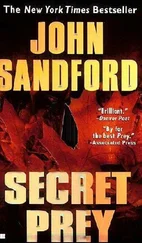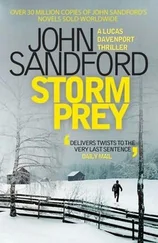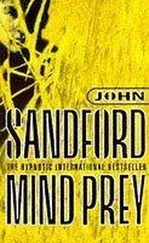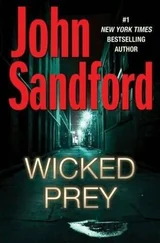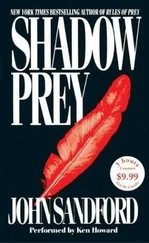John Sandford - Mortal Prey
Здесь есть возможность читать онлайн «John Sandford - Mortal Prey» весь текст электронной книги совершенно бесплатно (целиком полную версию без сокращений). В некоторых случаях можно слушать аудио, скачать через торрент в формате fb2 и присутствует краткое содержание. Жанр: Триллер, на английском языке. Описание произведения, (предисловие) а так же отзывы посетителей доступны на портале библиотеки ЛибКат.
- Название:Mortal Prey
- Автор:
- Жанр:
- Год:неизвестен
- ISBN:нет данных
- Рейтинг книги:4 / 5. Голосов: 1
-
Избранное:Добавить в избранное
- Отзывы:
-
Ваша оценка:
- 80
- 1
- 2
- 3
- 4
- 5
Mortal Prey: краткое содержание, описание и аннотация
Предлагаем к чтению аннотацию, описание, краткое содержание или предисловие (зависит от того, что написал сам автор книги «Mortal Prey»). Если вы не нашли необходимую информацию о книге — напишите в комментариях, мы постараемся отыскать её.
Mortal Prey — читать онлайн бесплатно полную книгу (весь текст) целиком
Ниже представлен текст книги, разбитый по страницам. Система сохранения места последней прочитанной страницы, позволяет с удобством читать онлайн бесплатно книгу «Mortal Prey», без необходимости каждый раз заново искать на чём Вы остановились. Поставьте закладку, и сможете в любой момент перейти на страницу, на которой закончили чтение.
Интервал:
Закладка:
Pollock had always been too tall, too skinny, with hands and feet too big for her bones. Over the years, she'd put on sixty pounds, and limped with the weight and weariness, like a woman fifteen years older. Rinker, on the other hand, was wearing jeans and a white blouse that looked fitted to her, with a haircut that cost a hell of a lot more than thirty dollars; and she held herself as rich ladies did, straight up, easy-walking, casual-eyed. Small hoop earrings that looked like gold.
"You still drink beer?" Clara asked.
" 'Course I do. You got some?"
"A sackful of Corona and a couple of lemons. I gotta talk to you about something."
Rinker got a grocery bag out of her car and she and Pollock walked side by side down the slanting sidewalk. Pollock had a two-bedroom apartment in a red brick house that had been painted white and looked as though Mark Twain might have walked past it. An elm tree had once stood in the patch of front yard, but had died years back of Dutch elm disease. The stump was still there, along with what her neighbors called a sucker maple, a clump of foliage that was a cross between a tree and a bush.
Pollock's apartment was two-bedroom only technically-the second bedroom might have been more useful as a closet. Pollock called it her shit room, because that's where she put all the shit she didn't use much. The place smelled of twelve years of baked potatoes and cheddar cheese and nicotine and human dirt. A small dry aquarium sat in a corner, the goldfish long gone. A photograph of Jesus hung over the TV, his hands pressed together in prayer, his eyes turned heavenward, his sacred heart glowing through his robe.
Rinker followed Pollock through the door and looked around. She didn't say, "Nice place," because Pollock was too old a friend, and they both knew exactly what kind of place it was: the kind of place that you could still rent for two hundred and fifty dollars a month, utilities included.
Pollock dropped her grocery sack on the kitchen table and said, "You want some ice in that beer?"
"Wouldn't mind," Rinker said. They'd drunk iced beer when they were kids. She put her bag on the table next to Pollock's, fished out a couple of bottles, and twisted the tops off. Pollock found glasses and filled them with ice, put a slice of lemon in each and a dash of salt. They went out to the front room, and Pollock dropped on her couch. Rinker took the La-Z-Boy, poured a little of the Corona over the ice, and held her glass up. "Big City," she said.
Pollock held hers up: "Big City." They both took a sip, and then Pollock said, "What's going on?"
"I'm running from the cops," Rinker said. "I need a place to stay for a couple of weeks."
"You got one," Pollock said promptly.
"More complicated than that, Patsy," Rinker said. "This is heavy shit. Everybody in the world is gonna be looking for me. The FBI, the St. Louis cops. If they find me here, and take you in, and fingerprint you, you're toast."
Pollock shook her head. "Makes no never-mind to me. You got a place. When I was running, you kept me for three months. Besides, they put me in jail, couldn't be no fuckin' worse than this place and my job."
"I got a load of money," Rinker said. "It won't cover the risk, but I'll give you a thousand a week plus whatever I got left over at the end." Pollock opened her mouth to object, but Rinker held up an imperious finger. "Don't want to hear about it. I'm leavin' the money, and you take it and spend it on something stupid."
"I can do that, no doubt about it," Pollock said. "Maybe buy a stair-climber, or something." She sucked up an ice cube, ran it a couple of times around her mouth, and then spit it back into the beer. "So tell me what you're up to."
Pollock threw most of the shit out of the shit room, and Rinker put down an inflatable guest mattress she'd bought at a Target store, with a sheet and an acrylic blanket. Her clothes stayed in her suitcase. Pollock's landlady had an extra space in the garage next door, and Pollock walked around the house and rented it, thirty dollars a month, so that Rinker would have a place to put the California car. That night, Rinker left Pollock in front of her television and began to scout the men she'd come to kill.
Nanny Dichter was the richest of the bunch, with a home in Frontenac; he had a fountain on the front lawn. The fountain, in the figure of a small girl with a water jug on her back, was carved out of golden marble imported from Austria. Dichter sold drugs, and had for most of his adult life. He'd been one of the first to make cocaine imports into a business, instead of an adventure. He was married, had two sons and four daughters, and three or four live-in servants. He owned the majority interest in a chain of midwestern mall-based import stores that sold native art to the aesthetically impaired, and provided a convenient network for his bulk cocaine sales.
Paul Dallaglio worked with Dichter, taking care of competitive issues, which was how he'd met Rinker. He'd used her nine times and paid her a little more than a half million dollars. He lived not far from Dichter in a home on a heavily wooded lot in Creve Coeur. He was executive vice president and part owner of the import chain.
Andy Levy was a banker, and worked a straight job as vice president of development with First Heartland National of St. Louis; he handled most of the mob money in St. Louis, including Rinker's, before she moved to Wichita. He lived in a huge old redbrick cube in Central West End, and was a patron of the performing arts-he dated dancers, and sometimes actresses. Rinker had killed Levy's wife and her lawyer when the marriage went on the rocks, and the lawyer was foolish enough to threaten Levy with the exposure of his money operation. Levy liked to walk in Forest Park. He'd once been banned from the zoo for throwing center-cut pork chops to the lions.
Finally there was John Ross, who'd originally recruited Rinker and taught her the gun trade. Ross ran an overworld liquor distributorship, and had interests in vending machine and trucking businesses. He had parallel shadow businesses in cocaine, sports betting, and loan-sharking. He was retail, to Nanny Dichter's wholesale. He'd also acted as Rinker's agent, selling her guns for cash, and taking his cut in clout rather than money. Ross lived off a semiprivate street in Ladue in the center of six acres of lawn. He'd been Rinker's friend and protector, though when she'd been broken out by the cops, he'd tried to have her killed. She gave him that one, because of their history, but had warned him at the time that if there was another unsuccessful attempt, she'd be coming for him.
Dichter and Ross were smart and personally violent. Dallaglio was essentially a criminal executive who worked by remote control. He'd never gotten his hands bloody, but he did know how to protect himself. Levy barely thought of himself as criminal-he was just a guy who knew some guys, and like a bunch of Rotarians, they all threw business at each other.
Every one of the four men knew too much about each of the others, and more than enough about Rinker. While any one of the four could have authored the assassination in Cancun, it was unlikely that any one of them would have done it on his own hook. They walked carefully around each other, and none of them would want to be blamed if something had gone wrong, as it had. They'd have talked.
Rinker slept in Pollock's room for three more days, going out at night, getting a handle on the town. She knew it well from her days as a dancer, and with Ross at the liquor warehouse, but there were always changes, and she'd never really surveyed it from the perspective of an assassin.
She needed to know what was open, and when. Where she could ditch, if she ran into trouble. Where she could pick up a car in a hurry. Where the targets did their business. As she wandered around town, she refined her ideas about her approaches to the targets.
Читать дальшеИнтервал:
Закладка:
Похожие книги на «Mortal Prey»
Представляем Вашему вниманию похожие книги на «Mortal Prey» списком для выбора. Мы отобрали схожую по названию и смыслу литературу в надежде предоставить читателям больше вариантов отыскать новые, интересные, ещё непрочитанные произведения.
Обсуждение, отзывы о книге «Mortal Prey» и просто собственные мнения читателей. Оставьте ваши комментарии, напишите, что Вы думаете о произведении, его смысле или главных героях. Укажите что конкретно понравилось, а что нет, и почему Вы так считаете.


